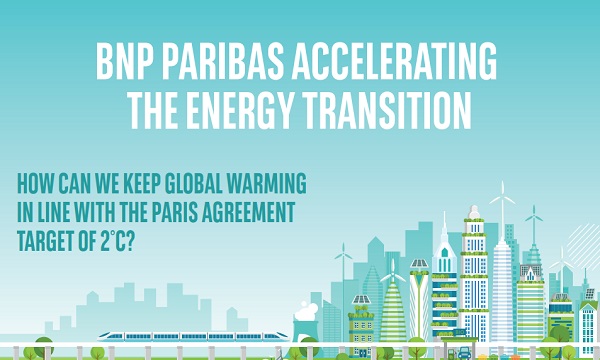 Credit: BNP Paribas
Credit: BNP Paribas
The BNP Paribas group, of which the Luxembourg bank BGL BNP Paribas is a member, has announced a timeframe in which it aims to cease all thermal coal financing, as well as its decision to raise its financing targets for renewable energies.
BNP Paribas has decided to cease all its financing related to the thermal coal sector in 2030 in the European Union and by 2040 worldwide. The Group will also be strengthening its support for the development of renewable energies, with a new financing target of €18 billion by 2021.
In light of the current climate emergency, BGL BNP Paribas plans to encourage the transition of electricity producers to a production model with the lowest possible CO2 emissions. In 2015, the Bank committed to accelerating the energy transition by aligning its financing and investment activities with the conclusions of the Paris agreement. Since then, the Bank has regularly changed its customer support policies and stopped financing for certain categories of companies that are not engaged in a transition.
As a result, at the end of 2015, BNP Paribas significantly strengthened its financing and investment criteria in the coal sector. In 2017, the Bank was the first to announce that it will cease financing activities for companies that derive most of their revenues from non-conventional hydrocarbons, measures that remain among the most advanced in the sector to date.
Resources released and commercial efforts will thus be redirected towards financing the players in transition and renewable energies. In line with this strategy to accelerate the energy transition, BNP Paribas is aiming to reduce its exposure to thermal coal to zero by 2030 in the EU and by 2040 worldwide. While funding for new coal fired power plant projects has completely ceased since 2017, the policy has been strengthened with regard to general credits granted to electricity producers, some of whose production is still based on coal.
To achieve this objective, the Bank will intensify its dialogue with utilities who produce part of their electricity from coal to analyse the extent to which their evolution trajectory is compatible with the Group's exit objectives by geographic area. In particular, the bank will cease its relations with producers who plan new coal fired-power generation capabilities.
With these new commitments, BNP Paribas is attempted to achieve its goal of reducing by 85% between 2014 and 2040 the CO2 intensity of its worldwide electricity mix currently financed, in line with the Sustainable Development Scenario (SDS) of the International Energy Agency (IEA). For the sake of transparency, the Group will continue to publish annually the breakdown by energy source of its financing to electricity generation worldwide.
In addition, BNP Paribas is setting new financing targets for renewable energies to accelerate their development. In 2015, the Bank announced its intention to double its financing for renewable energies and thus reach €15 billion by 2020. As these financings reached €5.4 billion at 31 December 2018 and therefore exceeded this initial target, BNP Paribas has defined a new financing target of €18 billion by 2021.
Jean Laurent Bonnafé, Director and Chief Executive Officer of BNP Paribas, commented: "Like all players in the economy and society whose objective is to contribute to the necessary transition to a lower carbon economic model, BNP Paribas has a role to play. As a bank, we have the opportunity, and the will, to participate in the acceleration of the energy transition by supporting our customers in this necessary transformation. To succeed, such a transition must be fair and balanced, taking into account the reality of the economic model and the daily needs of people around the world. These new commitments, which have clear objectives, mark a new stage in our objective of making a decisive contribution to the climate challenge".








